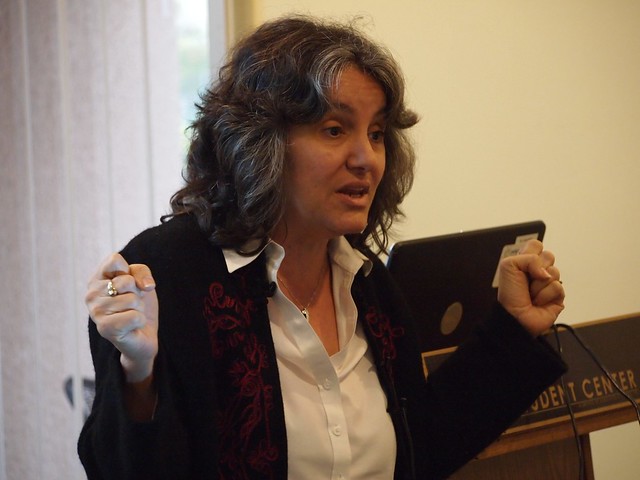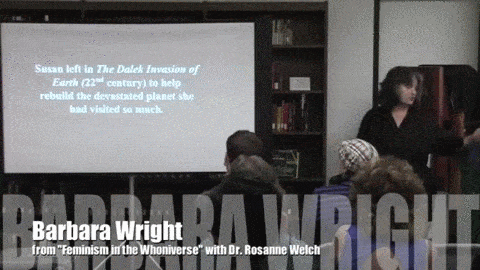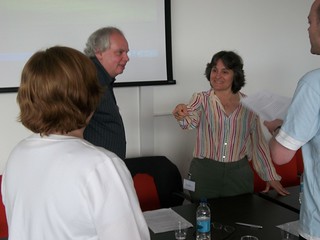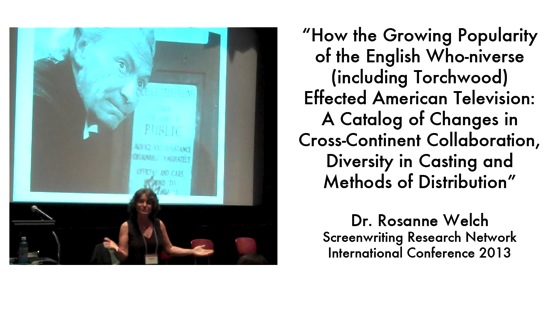Dr. Rosanne Welch presents Why Monkees Matter: How The Writing Staff of The Monkees Brought the 1960s Counter Culture to Mainstream Pre-Teen Viewers at the 2014 Cal Poly Pomona Provost’s Symposium on Faculty Scholarship (http://www.cpp.edu/~research/)
Transcript:
Welcome everybody! We’re talking today about “Why Monkees matter?” Please notice the spelling. I am not talking about this kind of monkey — that’s in a different class. I’m talking about these Monkees. In case you don’t know who they are, Davie Jones, Micky Dolenz, Peter Tork and Michael Nesmith who, in 1967, their albums outsold The Beatles and The Rolling Stones combined. They had more albums sales due to their exposure on television. So, what I talk about — I’m doing a book right now on them — and so I am talking about what we learned from them. Particularly, I focus on the writers of television programs and authorship. That’s my thing, because we focus on directors as auteurs of film and we don’t realize — or we forget — that writers, are just like the writers of books. A director can’t direct 20 empty pages. Somebody put these thoughts down and what are these thoughts. So, “How the writing staff of The Monkees brought the 1960’s counter-culture to mainstream pre-teen viewers.” These are the children whose older brothers and sisters already love The Beatles and they’re learning about hippy culture from The Beatles, but these kids don’t have access to buying their own albums yet, but they have access to television, because it’s free and they can watch it all the time.
View photos from this presentation
Description:
Based on a chapter in my upcoming book The Metatextual Menagerie that was The Monkees, which includes a series of interviews conducted with surviving writers and performers of the 1960s television program, The Monkees I will discuss how the writers and actors used the show as a platform for their own emerging counter culture/anti-war messages.
Worth studying for its craft and place in television history (the show won an Emmy as Best Comedy Of 1967) the program’s true importance may come from its impact on the politics and culture of the era. Considered innocuous by the network, thepress and the parents of the era, the storylines and jokes created by the writers and the actor’s ad-libs brought the emerging counter-culture to the attention of young teens whose parents might not have appreciated the message. Cultural icons such as Timothy Leary recognized the subversive nature of the program, seen through the writing and in choices made about costuming, hair length, musical guests (Frank Zappa, Tim Buckley, Charlie Smalls) and songs performed by the band brought issues of Vietnam, voting and civil rights to the ‘young generation’ for whom the show clearly had ‘somethin’to say.
Dr. Rosanne Web Site and Bloghttps://rosannewelch.com
Follow Dr. Welch on Twitterhttp://twitter.com/rosannewelch
Follow Dr. Welch on Tumblrhttp://drrosannewelch.tumblr.com/
Subscribe to Dr. Welch’s YouTube Channel
About the Symposium:
The 2014 Provost’s Symposium is a forum to learn about each other’s scholarly work, make new friends, renew old acquaintances, and enhance our appreciation of the rich and diverse array of professional endeavors pursued by the faculty at Cal Poly Pomona.
Podcast: Play in new window | Download
Subscribe: RSS









